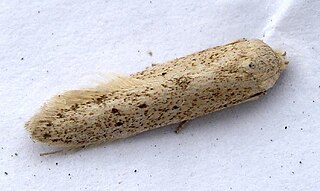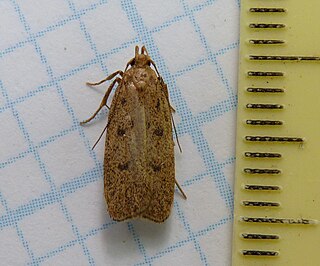Related Research Articles

Gelechioidea is the superfamily of moths that contains the case-bearers, twirler moths, and relatives, also simply called curved-horn moths or gelechioid moths. It is a large and poorly understood '"micromoth" superfamily, constituting one of the basal lineages of the Ditrysia.

The Coleophoridae are a family of small moths, belonging to the huge superfamily Gelechioidea. Collectively known as case-bearers, casebearing moths or case moths, this family is represented on all continents, but the majority are found in temperate areas of the Northern Hemisphere. They are most common in the Palearctic, and rare in sub-Saharan Africa, South America, and Australia; consequently, they probably originated in northern Eurasia. They are relatively common in houses, they seek out moist areas to rest and procreate.

The Batrachedridae are a small family of tiny moths. These are small, slender moths which rest with their wings wrapped tightly around their bodies.

The Blastobasidae are a family of moths in the superfamily Gelechioidea. Its species can be found almost anywhere in the world, though in some places they are not native but introduced by humans. In some arrangements, these moths are included in the case-bearer family (Coleophoridae) as subfamily Blastobasinae. The Symmocidae are sometimes included in the Blastobasidae as subfamily or tribe.

Blastobasis is the type genus of the gelechioid moth family Blastobasidae; in some arrangements these are placed in the case-bearer family (Coleophoridae) as a subfamily. Within the Blastobasidae, the subfamily Blastobasinae has been established to distinguish the Blastobasis lineage from the group around Holcocera, but the delimitation is not yet well-resolved.
Nasamonica is a genus of moths, belonging to the family Coleophoridae or Momphidae. It contains only one species, Nasamonica oxymorpha, which is found in Chad.
Coleophora caespititiella is a moth of the family Coleophoridae. This species is found throughout the United Kingdom and much of Europe. It is also known from North America. The Coleophoridae group are often collectively known as the case moths or case-bearers.

The Symmocinae are a subfamily of moths in the superfamily Gelechioidea. These small moths are found mainly in the Palearctic and Africa.
Coleophora serinipennella is a moth of the family Coleophoridae. It is found in southern Europe, North Africa, the Near East, the eastern Palearctic realm, as well as in Australia in south-western Queensland, South Australia and arid areas of Western Australia south of Carnarvon.

Coleophora ornatipennella is a small moth of the family Coleophoridae.
Coleophora squamosella is a moth of the family Coleophoridae. It is found in Europe, the Baltic states, the Caucasus, Russia and Turkey.
Coleophora euryaula is a moth of the family Coleophoridae. It is found in Egypt.
Coleophora falkovitshella is a moth of the family Coleophoridae. It is found in Mongolia and Korea.
Augasma aeratella is a moth of the family Coleophoridae. It is found in most of Europe. The habitat consists of open landscapes of forest-steppe and steppe biotopes.
Goniodoma auroguttella is a moth of the family Coleophoridae. It is found in southern Europe, European Russia and Asia Minor. The habitat consists of steppe and semi-desert biotopes.
Goniodoma nemesi is a moth of the family Coleophoridae. It is found in Croatia, Italy, Greece and Romania.

Metriotes lutarea is a moth of the family Coleophoridae. It is found in most of Europe and Turkey.

David Adamski is an American entomologist working as a research associate at the Smithsonian Institution's National Museum of Natural History and a support scientist in the Systematic Entomology Laboratory (SEL), United States Department of Agriculture in Washington, D.C. He obtained a PhD degree from the Mississippi State University, Department of Entomology in 1987 after defending a dissertation, titled "The Morphology and evolution of North American Blastobasidae (Lepidoptera:Gelechioidea)". His research interests focus on alpha taxonomy, life histories and morphology of moths. Over the years, Adamski produced more than 80 scholarly publications, some in collaboration, shedding light on discernible groups of Lepidoptera including Gelechioidea, Tortricoidea, Pyralidoidea, and Noctuoidea. He studied divergent taxa within the Auchenorrhyncha and Sternorrhyncha, and Phytophagous Acari, as well as Gelechioidea and Blastobasidae. Adamski is a member of the Entomological Society of Washington.
References
| Wikispecies has information related to Porotica . |